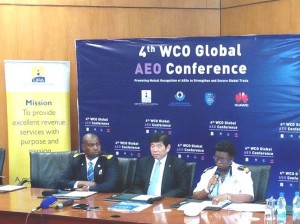South Sudan missing as EAC, South Korea sign AEO action plan
 KAMPALA, March 14, 2018 – South Sudan was today conspicuously missing from the World Customs Organization (WCO) Global Authorized Economic Operator (AEO) Conference in Kampala as its partners under the East African Community and the South Korea Customs Service inked an MoU on establishing a mutual recognition agreement (MRA) for their respective AEO’s.
KAMPALA, March 14, 2018 – South Sudan was today conspicuously missing from the World Customs Organization (WCO) Global Authorized Economic Operator (AEO) Conference in Kampala as its partners under the East African Community and the South Korea Customs Service inked an MoU on establishing a mutual recognition agreement (MRA) for their respective AEO’s.
The fourth edition of the global customs meet, the first to be held in Africa, opened a day after South Sudan President Salvar Kiir had sacked his finance minister and army chief adding to the uncertainty that has become typical of the country over the past five years. But analysts were quick to point out that the most recent entrant to the EAC, who has experienced political and economic instability since December 2013, was yet to embrace the Authorised Economic Operator programme.
Mr. Musoni William, Rwanda’s Deputy Commissioner for Customs who signed the document on behalf of the regional economic bloc said once fully developed, the mutual recognition agreement would provide for seamless enjoyment of AEO privileges for accredited businesses within the two customs territories.
The EAC-South Korea MoU was preceded by Peru and Uruguay signing their MRA, also in Kampala today.
South Sudan’s absence became apparent during an impromptu rollcall by President Yoweri Museveni who opened the three day event that is hosted by Uganda Revenue Authority (URA) under the theme, “Promoting Mutual Recognition of AEOs to Strengthen and Secure Global Trade.”
Rwanda and Burundi were represented by modest delegations to the event that provides a platform for players in international trade to discuss trade facilitation initiatives and share best practices.
“We chose Uganda as the first African country to host this event in Africa because we see huge potential for economic growth. The Ugandan government has provided great support to regional and International Trade through Customs modernization which presents more opportunities to trade within the region and improve economic competitiveness. This conference therefore provides a platform where we can share best practices, exchange success stories from AEO members as well as address challenges faced in implementing AEO,” said Dr. Kunio Mikuriya, the WCO’s Secretary General of the World Customs Organisation.
Ms. Doris Akol, the Commissioner General of the Uganda Revenue Authority said Uganda, with 51 authorised economic operators accounting for close to 28percent of revenue collections had been chosen to host the first meeting on the continent because it had the most mature AEO program in Africa. The benefits enjoyed by authorised firms in terms of shorter turnaround times were attracting more firms to join with many more still in the pipeline for accreditation she added.
“The AEO program comprises of a special group of companies that enjoy preferential treatment as a result of their customs compliance. This means shorter time through customs clearance without the entire spectrum of checks.
“It ensures members have shorter turnaround time while clearing goods hence better turnovers for their businesses. It also helps Customs Administration collect money in form of taxes quicker,” Akol said.
Regionally, five of the six East African Community (EAC) countries (Uganda, Kenya, Burundi, Rwanda and Tanzania) are implementing AEO programmes at the national and regional level. So far, the EAC AEO regional program has accredited 46 companies that enjoy recognition and benefits from across the EAC.
The AEO program is being implemented by most of the WCO member states and currently, there are 77 AEO programs worldwide.
Other than the AEO program, Uganda has implemented the Single Customs Territory, One Stop Border Points, (goods and passengers processed once at borders), real time monitoring of cargo, Central Document Processing Center (harmonized customs values) and the Uganda Electronic Single Window (permit issuance).
The conference attracted slightly more than 1,000 delegates from 169 countries and more than 100 experts. They include representatives from Customs administrations, the business community, government, as well as policy makers and academicians who will discuss the successes and challenges of Customs and the Private Sector in implementing AEO programs over a three-day period.

 African Heads of state head to South Korea next week for Summit talks
African Heads of state head to South Korea next week for Summit talks
 Trading leads as main source of income for Ugandans
Trading leads as main source of income for Ugandans
 New leadership for bankers’ umbrella as total assets top $12 billion
New leadership for bankers’ umbrella as total assets top $12 billion
 Brussels Airlines to announce Nairobi service
Brussels Airlines to announce Nairobi service
 SITA promises enhanced travel experience after Materna acquisition
SITA promises enhanced travel experience after Materna acquisition
 Saudia’s 105 aircraft order stretches A320neo lead over rival Max
Saudia’s 105 aircraft order stretches A320neo lead over rival Max
